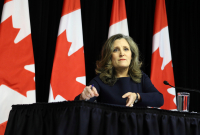Thank you for helping us meet our fundraising goal!
After facing severe political blowback for its carbon tax exemption on oil last fall, Ottawa is caving to complaints for a second time and doubling rebates for First Nation governments.
Exemptions remain off the table for First Nations. However, in Tuesday’s budget, Ottawa did go part way to meet their demands by increasing the amount First Nations governments receive from carbon-pricing payouts to two per cent starting this year. For First Nations in Ontario that will mean a rebate jump from $56.6 million in 2023 to $135.5 million this year.
The federal government had promised not to give further exemptions after announcing a three-year carbon tax exemption last October for home heating oil and higher carbon tax rebates for people in rural areas. Those measures were intended to bring relief amid soaring costs of living.
The Chiefs of Ontario (COO) launched a judicial review of carbon pricing last fall, claiming the consumer fuel surcharge is discriminatory. The COO argued that Indigenous Peoples file taxes at a lower rate but are subject to higher federal carbon pricing because remote communities depend on higher-cost fuels like diesel for power, as well as trapping, hunting and fishing.
Chiefs have told Canada's National Observer that fuel prices in remote First Nations can be double or triple those in Canadian cities.
A complete First Nations exemption to the carbon-pricing fuel charge is the “ideal world,” said Abram Benedict, grand chief of the Mohawk Council of Akwesasne and the carbon-pricing file lead for the COO.
The hike in carbon-pricing payouts for First Nation governments in Ontario was a previous ask by the COO, Benedict confirmed. It’s still unclear if the amount is enough to counterbalance the high fuel costs and demands on reserves across the province, particularly in the North, he explained in an interview with Canada’s National Observer.
The COO argued that the previous one per cent collection of total charges for First Nations in Ontario was “arbitrary and inadequate.”
The rebate increase to two per cent is still arbitrary, Benedict noted, adding it’s difficult for Ottawa to “know exactly what’s being taken out of First Nations communities” through carbon pricing.
The COO is now waiting to see how the funds will be administered, given the diversity of needs of First Nations across Ontario. Some First Nations have thousands of people, while others have hundreds.
Some First Nations in Canada may already receive an exemption, according to internal documents obtained by Canada’s National Observer through the Access to Information Act. First Nations in provinces like British Columbia, which administers its own carbon-pricing system, can “allow for certain limited tax exemption for First Nations under the Indian Act,” the documents say.
Ottawa is undertaking an analysis of the impacts of carbon pricing on First Nations, Métis and Inuit, which will be completed by 2026, a spokesperson for Environment and Climate Change Canada told Canada’s National Observer.
The rebate amount is connected with return increases to small- and medium-sized businesses also announced in Tuesday’s budget.







Comments